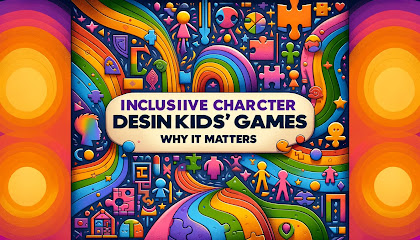In the dynamic world of kids' games, where imagination and education
intersect, the importance of inclusive character design cannot be
overstated. As the digital age continues to evolve, the diversity of game
players expands, making it essential for game developers to create
characters that reflect a wide range of cultures, abilities, and backgrounds
. This approach not only enriches the gaming experience for young
players but also plays a crucial role in fostering empathy, understanding,
and self-identity among them. Here, we delve into why inclusive
character design is pivotal in kids' games and how it can be
effectively implemented through hiring a skilled character designer
and utilizing proficient kids' game development services.
The Importance of Representation
Children are impressionable; the media they consume significantly
influences their understanding of the world and their place within it.
When kids see characters who look like them, share their experiences,
or face and overcome similar challenges, it validates their existence
and boosts their self-esteem. Conversely, the absence of diversity in
character representation can lead to feelings of exclusion and inferiority.
Inclusive character design acknowledges and celebrates the variety of
human experiences, teaching children to appreciate diversity from an
early age.
Enhancing Engagement Through Relatability
Engagement is key to the success of any kids' game. Inclusive
characters, designed with a broad audience in mind, allow more
children to form connections with the game. These characters
become relatable avatars that players can see themselves in,
thereby enhancing the immersive experience of the game. Hiring
a character designer who understands the nuances of inclusive
design is crucial in achieving this level of engagement. These
professionals possess the skills and sensitivity needed to create
characters that resonate with a diverse audience, ensuring that
each player feels seen and understood.
Fostering Empathy and Social Skills
Games are not just for entertainment; they are also powerful tools
for education and socialization. By introducing players to characters
with different backgrounds, abilities, and perspectives, kids' games
can promote empathy and social skills. Children learn to understand
and respect differences, which is essential in our increasingly
globalized world. The role of kids' game development services in
this aspect is to ensure that these inclusive characters are seamlessly
integrated into engaging and educational gameplay, providing a safe
space for children to explore and learn about diversity.
Meeting the Demand for Inclusive Content
The demand for inclusive content in kids' games is growing, driven by
a more aware and diverse generation of parents and educators who
recognize the value of representation. This demographic seeks out
games that reflect the world's diversity, encouraging game developers
to prioritize inclusivity in their character designs. By choosing to hire
a character designer with a portfolio that demonstrates a commitment
to inclusivity, game developers can better meet this demand. Additionally,
working with kids' game development services that share this
commitment can further ensure that the final product is not only
entertaining but also culturally sensitive and inclusive.
Implementing Inclusive Character Design
Effective inclusive character design requires a deliberate and thoughtful
approach. It begins with research and consultation to understand the
diverse experiences and characteristics of the audience.
Hiring a character designer who is skilled in creating a range of
characters that are diverse in race, gender, ability, and more is a critical
step. These designers can work closely with kids' game development
services to ensure that the characters are not only visually diverse but
also have depth, with backgrounds and stories that reflect a wide range
of experiences.
Conclusion
Inclusive character design in kids' games is more than a trend; it is a
necessary evolution in the way we create digital experiences for children.
It fosters a sense of belonging, promotes empathy, and prepares young
players to thrive in a diverse world. The key to achieving this inclusivity
lies in the decision to hire character designers who are committed to
representing diversity and utilizing kids' game development services that
prioritize inclusivity in their projects. Together, they can create engaging,
educational, and inclusive games that reflect the rich tapestry of human
experience, making every child feel valued and included.
Read more blogs about the gaming industry:
The Role of AI in Customizing Game Physics in Godot
The Role of AI in Developing Multiplayer Games with Godot
Creating Intelligent Game Environments in Godot with AI
AI and Godot: Innovations in Game Design and Development

.jpg)

.jpg)
No comments:
Post a Comment